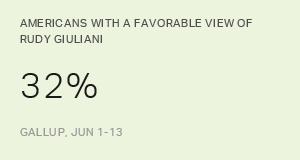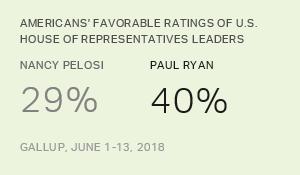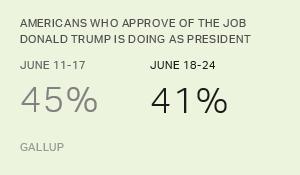Story Highlights
- 32% in U.S. have a favorable view, 45% unfavorable opinion of Giuliani
- First time he has had more negative than positive ratings
- Mike Pence's ratings stable, with 42% viewing him favorably
WASHINGTON, D.C. -- Americans have a more negative view of former New York City Mayor Rudy Giuliani today than at any other point in Gallup's trend, which includes multiple ratings in the years 2004-2008, along with two updates over the past two years. Thirty-two percent now say they have a positive view of Giuliani, his lowest favorable rating. It is also the first time more Americans have had a negative (45%) rather than positive view of the man called "America's mayor," after he led the city through the 9/11 tragedy.
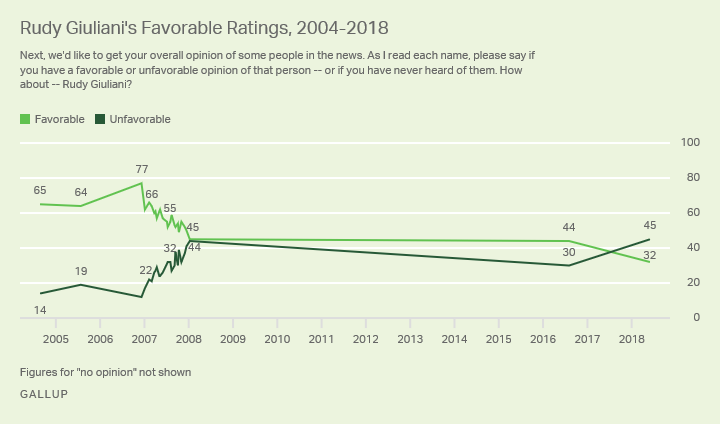
Giuliani's low favorable rating is from a June 1-13 Gallup poll, and comes as the former mayor and presidential candidate has taken on a new role as a member of President Donald Trump's legal team. When Gallup first polled on him in 2004 and 2005, nearly two-thirds of Americans had a favorable view of him, twice as many as do so today.
In the lead-up to his 2007 run for president, Giuliani, who was also known as a tough district attorney before becoming New York City's mayor, received higher likability scores than the leading candidates of both parties -- peaking at 77% in December 2006. His image declined over the course of the campaign as he took on a more obviously partisan role as a Republican presidential candidate. His campaign failed to gain traction, leading to him dropping out of several early primaries and caucuses. In Gallup's final measurement of him in January 2008, his favorable rating had fallen to 45% (with 44% unfavorable) just weeks before he dropped out of the 2008 race.
By the time Giuliani re-emerged on the national political scene as supporter of Trump in the 2016 presidential campaign, the former mayor's favorable ratings were largely unchanged (44%) but his negatives had fallen (30%) so that he was once again viewed much more positively than negatively (but with fewer Americans having an opinion of him). This poll came after the GOP convention, at which Giuliani had a key speaking role.
Giuliani's new role as a legal adviser to Trump, including his prominent involvement with the Stormy Daniels matter, has hurt his image. His work in that regard has been plagued by having to walk back prior statements he has made, including several that contradicted those made by the president. Giuliani's current -13 net favorable rating is slightly more negative than his boss'; Trump's net favorable rating is -9 (45% favorable, 54% unfavorable).
Giuliani's Ratings Down Among All Party Groups
Though a majority of Republicans view Giuliani favorably (61%), this is, by two percentage points, the lowest rating he has received from his own party in Gallup's trend. Twenty-two percent of Republicans have an unfavorable view of him, making Giuliani's current net favorable score +39 -- his second lowest net favorable in the trend, after a +34 score in January 2008. Working for Trump, who remains popular among the GOP, does not appear to have increased his standing among Republicans -- possibly due to Giuliani's series of contradictory statements in the spring that caused trouble for Trump's legal team.
Meanwhile, Giuliani has also bottomed out with independents (29%) and Democrats (11%). His standing among both party groups has declined by double digits since 2016, and their respective ratings for him are now at a new low. Giuliani was liked by majorities of Democrats and independents in several polls leading up to and shortly after his 2008 presidential run, but he has failed to receive a favorable rating from a majority of either group in over a decade.
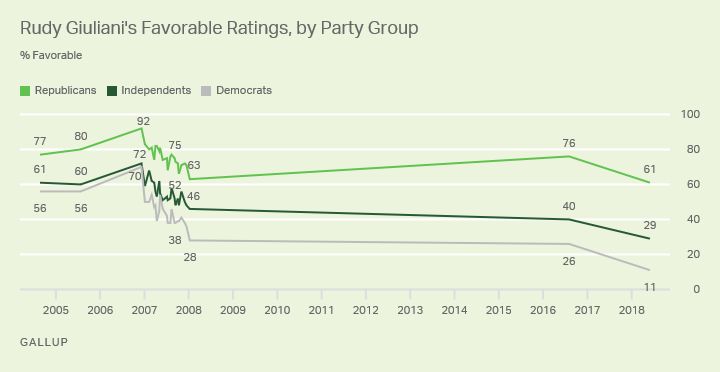
Mike Pence's Favorable Rating Stable at 42%
While Giuliani's image has deteriorated, Vice President Mike Pence remains about as liked by Americans as he has been since the presidential election that put him in the White House. His current 42% rating fall inside the narrow 41% to 46% range the vice president has remained within since the week before his election in November 2016. Pence also receives 42% unfavorable ratings, with 16% having no opinion.
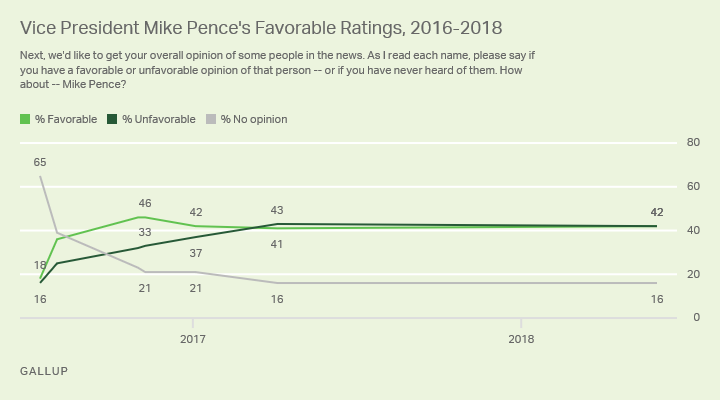
Pence's favorable image is on par with Trump's 45%, but the vice president is more popular on a net favorable basis than the president, given that Pence's unfavorable ratings are the same as his favorables, while Trump is a net negative overall. Like Trump, Pence is most popular with Republicans (81%), and less popular among independents (36%) and Democrats (14%).
Bottom Line
The trend in Giuliani's favorability shows the fall from grace of a mayor who was revered in the post-9/11 era, and who was the early front-runner for the 2008 Republican presidential nomination. A decade after a series of polls found him to be widely liked, even by people outside of his own party, Giuliani's image has taken a big hit.
For many Americans who disapprove of Trump, Giuliani's loyalty to and association with the president has apparently resulted in a much less favorable view of him than they had in the 2000s. Among Republicans, his decreased ratings may have been the result of a series of embarrassments he caused early on in his time on the president's legal team. While other individuals in Trump's orbit, including Pence, have received ratings that are as favorable as or more favorable than Trump's own ratings, Giuliani is the exception, as his net favorable rating falls short of the president's.
Survey Methods
Results for this Gallup poll are based on telephone interviews conducted June 1-13, 2018, with a random sample of 1,520 adults, aged 18 and older, living in all 50 U.S. states and the District of Columbia. For results based on the total sample of national adults, the margin of sampling error is ±3 percentage points at the 95% confidence level. All reported margins of sampling error include computed design effects for weighting.
Each sample of national adults includes a minimum quota of 70% cellphone respondents and 30% landline respondents, with additional minimum quotas by time zone within region. Landline and cellular telephone numbers are selected using random-digit-dial methods.
[View survey methodology, complete question responses and trends.]
Learn more about how the Gallup U.S. Poll works.
